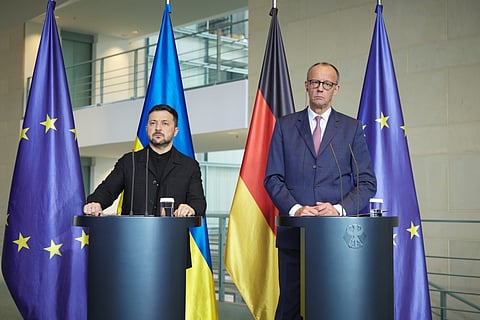

Germany’s newly elected Chancellor, Friedrich Merz, has pledged to assist Ukraine in producing long-range missiles to bolster its defense against Russian attacks. Speaking alongside Ukrainian President Volodymyr Zelensky in Berlin, Merz confirmed that the two nations would sign a memorandum of understanding on joint weapons production but declined to disclose specifics.
"We want to talk about production, and we will not publicly discuss details," Merz told reporters when asked whether Germany would supply Ukraine with its Taurus missiles, which have a range of 500 kilometers.
Merz, who took office earlier this month, has vowed to strengthen Germany’s support for Ukraine, announcing this week that Western allies had lifted all range restrictions on weapons supplied to Kiev. Although he did not explicitly mention the Taurus system during the press conference, he confirmed that German and Ukrainian defense ministers would formalize an agreement on long-range missile cooperation.
The Kremlin swiftly condemned the move, warning that removing range limitations would mark a "dangerous shift" in policy and undermine diplomatic efforts to reach a ceasefire. Russian Foreign Minister Sergei Lavrov dismissed Merz’s announcement as "pretentious," while Kremlin spokesperson Dmitry Peskov cautioned that allowing Ukraine to strike deeper into Russian territory would escalate the conflict.
Merz later clarified that the decision to lift restrictions had been made months ago by Western allies, emphasizing that Ukraine had the right to defend itself against military targets beyond its borders. His assertive stance marks a departure from the cautious approach of his predecessor, Olaf Scholz, who had resisted sending Taurus missiles over fears of provoking Russia.
During the press conference, Zelensky reiterated calls for peace negotiations involving himself, Russian President Vladimir Putin, and U.S. President Donald Trump. While the Kremlin did not outright reject the proposal, Peskov stated that such a meeting would require preliminary agreements between negotiating teams.
Meanwhile, fighting continues to intensify. Ukrainian forces launched one of their largest drone attacks on Russian targets overnight, while Zelensky reported that Russia had fired over 900 drones in a three-day span. On the northeastern front, Russian troops have amassed over 50,000 soldiers near Sumy, seizing several villages in what Putin describes as an effort to establish "security buffer zones."
In a further show of support, Germany announced a €5 billion military aid package for Ukraine, including funding for domestically produced weapons that could be deployed within weeks. Merz framed the long-range missile cooperation as the beginning of a "new form of military-industrial partnership" between the two nations.
Despite internal criticism from some German lawmakers, who accused Merz of sending mixed signals, his administration appears determined to take a firmer line against Moscow. As the war enters its fourth year, with tens of thousands dead and swaths of Ukrainian territory occupied, Berlin’s latest moves signal a deepening commitment to Kiev’s defense—and a willingness to challenge Russian aggression head-on.